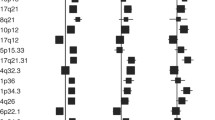Abstract
Recent candidate gene and genome wide association studies have revealed novel loci associated with an increased risk of breast cancer. We evaluated the effect of these breast cancer associated variants on ovarian cancer risk in individuals with familial ovarian cancer both with and without BRCA1 or BRCA2 mutations. A total of 158 unrelated white British women (54 BRCA1/2 mutation positive and 104 BRCA1/2 mutation negative) with familial ovarian cancer were genotyped for FGFR2, TNRC9/TOX3 and CASP8 variants. The p.Asp302His CASP8 variant was associated with reduced ovarian cancer risk in the familial BRCA1/2 mutation negative ovarian cancer cases (P = 0.016). The synonymous TNRC9/TOX3 (Ser51) variant was present at a significantly lower frequency than in patients with familial BRCA1/2 positive breast cancer (P = 0.0002). Our results indicate that variants in CASP8 and TNRC9/TOX3 alter the risk of disease in individuals affected with familial ovarian cancer.
Similar content being viewed by others
References
http://info.cancerresearchuk.org/cancerstats/types/ovary/incidence/index.htm
Stratton JF, Pharoah P, Smith SK, Easton D, Ponder BA (1998) A systematic review and meta-analysis of family history and risk of ovarian cancer. Br J Obstet Gynaecol 105:493–499
Antoniou AC, Easton DF (2006) Risk prediction models for familial breast cancer. Future Oncol 2:257–274
Gayther SA, Russell P, Harrington P, Antoniou AC, Easton DF, Ponder BA (1999) The contribution of germline BRCA1 and BRCA2 mutations to familial ovarian cancer: no evidence for other ovarian cancer-susceptibility genes. Am J Hum Genet 65:1021–1029
Pharoah PD, Antoniou AC, Easton DF, Ponder BA (2008) Polygenes, risk prediction, and targeted prevention of breast cancer. N Engl J Med 358:2796–2803
Song H, Ramus SJ, Tyrer J et al (2009) A genome-wide association study identifies a new ovarian cancer susceptibility locus on 9p22.2. Nat Genet 41:996–1000
Easton DF, Pooley KA, Dunning AM et al (2007) Genome-wide association study identifies novel breast cancer susceptibility loci. Nature 447:1087–1093
Cox A, Dunning AM, Garcia-Closas M et al (2007) A common coding variant in CASP8 is associated with breast cancer risk. Nat Genet 39:352–358
Ramus SJ, Vierkant RA, Johnatty SE et al (2008) Consortium analysis of 7 candidate SNPs for ovarian cancer. Int J Cancer 123:380–388
Song H, Ramus SJ, Kruger Kjaer S et al (2009) Association between invasive ovarian cancer susceptibility and 11 best candidate SNPs from breast cancer genome-wide association study. Hum Mol Genet 18:2297–2304
Gates MA, Tworoger SS, Terry KL et al (2009) Breast cancer susceptibility alleles and ovarian cancer risk in 2 study populations. Int J Cancer 124:729–733
Latif A, Hadfield KD, Roberts SA et al (2010) Breast cancer susceptibility variants alter risks in familial disease. J Med Genet 47:126–131
McIntosh A Shaw C, Evans G, et al (2004 updated 2006) Clinical guidelines and evidence review for the classification and care of women at risk of familial breast cancer. National Collaborating Centre for Primary Care/University of Sheffield, London. NICE guideline CG041 www.nice.org.uk
Evans DG, Young K, Bulman M, Shenton A, Wallace A, Lalloo F (2008) Probability of BRCA1/2 mutation varies with ovarian histology: results from screening 442 ovarian cancer families. Clin Genet 73:338–345
Bergqvist J, Latif A, Roberts SA et al RASSF1A polymorphism in familial breast cancer. Fam Cancer (in press)
The R Foundation for Statistical Computing (2008) The R project for statistical computing: The Comprehensive R Archive Network (CRAN), cited available from http://www.r-project.org/
Antoniou AC, Spurdle AB, Sinilnikova OM et al (2008) Common breast cancer-predisposition alleles are associated with breast cancer risk in BRCA1 and BRCA2 mutation carriers. Am J Hum Genet 82:937–948
Antoniou AC, Sinilnikova OM, McGuffog L et al (2009) Common variants in LSP1, 2q35 and 8q24 and breast cancer risk for BRCA1 and BRCA2 mutation carriers. Hum Mol Genet 15:4442–4456
Sergentanis TN, Economopoulos KP (2010) Association of two CASP8 polymorphisms with breast cancer risk: a meta-analysis. Breast Cancer Res Treat 120:229–234
Li C, Zhao H, Hu Z et al (2008) Genetic variants and haplotypes of the caspase-8 and caspase-10 genes contribute to susceptibility to cutaneous melanoma. Hum Mutat 29:1443–1451
Palanca Suela S, Esteban Cardeñosa E, Barragán González E et al (2010) CASP8 D302H polymorphism delays the age of onset of breast cancer in BRCA1 and BRCA2 carriers. Breast Cancer Res Treat 119:87–93
Antoniou AC, Easton DF (2003) Polygenic inheritance of breast cancer: implications for design of association studies. Genet Epidemiol 25:190–202
Acknowledgments
Genetic Medicine and SAR are supported by the NIHR Manchester Biomedical Research Centre and the Manchester Academic Health Sciences Centre (MAHSC). This study was funded by Genesis UK who had no role in study design; in the collection, analysis, and interpretation of data; in the writing of the manuscript; nor in the decision to submit the manuscript for publication. HMcB is supported by the CRUK.
Author information
Authors and Affiliations
Corresponding author
Rights and permissions
About this article
Cite this article
Latif, A., McBurney, H.J., Roberts, S.A. et al. Breast cancer susceptibility variants alter risk in familial ovarian cancer. Familial Cancer 9, 503–506 (2010). https://doi.org/10.1007/s10689-010-9349-2
Published:
Issue Date:
DOI: https://doi.org/10.1007/s10689-010-9349-2



